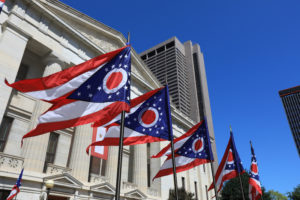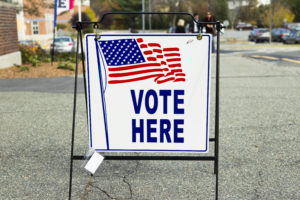
The Senate confirms Amy Coney Barrett to the Supreme Court, the Supreme Court declines to hear two election cases, and more…
IN THE NEWS
- In a 52-48 vote, the U.S. Senate confirmed Justice Amy Coney Barrett to the U.S. Supreme Court. The confirmation followed a swift nomination and hearing process. Senators voted along party lines, with the exception of Senator Susan Collins (R-Maine) who voted against Barrett’s confirmation. Senate Minority Leader Chuck Schumer (D-N.Y.) claimed that the Republican Senate majority is “doing the exact opposite of what it promised four years ago” when it refused to hold hearings for President Obama’s Supreme Court nominee, Judge Merrick Garland, about 80 days prior to the 2016 presidential election.
- In two 5-3 decisions, the Supreme Court declined to consider two election cases that challenged the rules for counting mail-in ballots received after Election Day. The issue in the North Carolina case was whether state election officials could alter the state legislature’s voting rules. The issue in the Pennsylvania case was if the state supreme court could override voting rules enacted by the state legislature. The decisions mean that North Carolina and Pennsylvania can count mail-in ballots received after Election Day, although the Court may reconsider the Pennsylvania ruling after Election Day. Newly confirmed Justice Amy Coney Barrett did not participate in the decisions because she did not have time to review the materials before the Court decided the case.
- The Federal Communications Commission (FCC) reaffirmed the 2017 repeal of Obama-era net neutrality regulations in a 3-2 vote. The 2015 regulations classified broadband as a public utility, preventing service providers from limiting internet access or offering paid “fast-lanes.” The Trump-appointed FCC Chairman Ajit Pai claimed that the regulations stifled innovation and investment in building and expanding broadband networks. A federal appeals court previously upheld many of the 2017 changes but recommended that the FCC reconsider the rule’s public impact.
- The U.S. Department of Homeland Security (DHS) issued a proposed rule that would award H-1B visas based on the expected wage levels of applicants, prioritizing those who would obtain relatively higher salaries in the United States. Under the current H-1B visa system, DHS awards college-educated, high-skilled foreign workers temporary visas through a random lottery. Acting DHS Deputy Secretary Ken Cuccinelli said the new selection process would allow the United States to “compete for the world’s best and brightest” and avoid “bringing in relatively lower-paid foreign labor at the expense of the American workforce.” Jon Baselice, executive director of immigration policy at the U.S. Chamber of Commerce, reportedly said that the proposed rule “will significantly disrupt the operations of many businesses by denying them access to the talent they need to grow and create jobs.”
- A coalition of Ohio landlords and the National Association of Home Builders sued the Centers for Disease Control and Prevention (CDC), claiming that the agency lacked authority to issue a temporary ban on evictions. The plaintiffs argued that although Congress authorized the CDC to take specific measures to prevent the spread of contagious diseases such as COVID-19, that authority does not extend to a nationwide eviction ban. In a brief supporting the CDC’s action, a group of scholars and housing advocates argued that the eviction ban was a legitimate exercise of the CDC’s authority to protect public health due to the increased risk of exposure to the coronavirus for people without stable housing.
- In a 5-3 decision, the Supreme Court denied a request to reinstate election rules in Wisconsin that would have extended the deadline to receive absentee ballots beyond Election Day. Chief Justice John Roberts explained that this case is different from the Court’s recent decision allowing Pennsylvania to extend the deadline to receive absentee ballots because the Pennsylvania case involved a state court rather than a federal court intervening in state lawmaking processes. In dissent, Justice Elena Kagan underscored the heightened need for mail-in ballots due to the coronavirus pandemic and, as a result, the importance of ensuring mail-in ballots are counted. Justice Kagan stated that the “Court’s decision will disenfranchise large numbers of responsible voters in the midst of hazardous pandemic conditions.”
- A federal judge in Massachusetts issued a nationwide injunction of a U.S. Department of Housing and Urban Development rule that would have made it more difficult to prove unintentional housing discrimination under the Fair Housing Act. The rule would have made it easier for defendants to justify policies with discriminatory effects in court, making it more difficult for fair housing organizations to prove violations of the Fair Housing Act. Iván Espinoza-Madrigal, executive director of Lawyers for Civil Rights, hailed the decision as a victory amid “an ever-worsening housing crisis” compounded by the effects of the global pandemic on “our most vulnerable community members.”
- The U.S. Agency for Global Media repealed a regulation that insulated federally funded news outlets such as Voice of America from editorial oversight by the federal government. The agency, which has authority over all non-military government broadcasting, claimed that the “firewall” rule prevented the agency from ensuring that its broadcasts “promote particular United States values and interests.” In a statement, U.S. Representative Eliot Engel (D-N.Y.) called for the firing of U.S. Agency for Global Media Chief Executive Officer Michael Pack, saying that he “has shown again and again that he doesn’t feel constrained by laws.”
- The FCC issued a proposed rule to lower the prices that people who are incarcerated pay to make interstate phone calls while in prison and jail. The FCC proposed lowering current interstate rate caps from $0.21 to $0.14 per minute for collect calls from prisons and from $0.25 to $0.16 per minute for collect calls from jails. The FCC proposed the change to meet the Communications Act’s objective that rates are “just and reasonable … and thereby enable incarcerated individuals and their loved ones to maintain critical connections.” The FCC also urged states to take steps “to address the egregiously high intrastate inmate calling services rates across the country,” which account for about 80 percent of inmate calls.
WHAT WE’RE READING THIS WEEK
- In a new research paper, Cary Coglianese, professor at the University of Pennsylvania Law School, and Shana Starobin, professor of environmental studies at Bowdoin College, evaluated the advantages and disadvantages of management-based regulation, a type of regulation especially common in environmental law. Unlike traditional forms of regulation that stipulate the means by which firms must meet specific obligations, management-based regulation focuses primarily on the activities of the managers of regulated firms. By requiring that managers put in place processes such as planning and analysis, management-based regulation allows firms to maintain flexibility in deciding how to solve the underlying problems that regulations are designed to address.
- In a research brief, Michael Karpman, Stephen Zuckerman, and Genevieve Kenney of the Urban Institute’s Health Policy Center examined how economic outcomes have changed for families since the coronavirus pandemic started. Karpman and his coauthors determined that the financial situations of nearly one-quarter of families have worsened, but also said that this finding masks “substantial variation by race and ethnicity and by income.” Latinx and Black families reported more often than white families that they were worse off financially, and that they were either laid off or otherwise had a loss of income. Karpman and his coauthors argued that economic hardship will worsen without renewed steps to strengthen economic support programs, such as the U.S. Congress passing a new coronavirus relief package.
- A report issued by the Brookings Institution and the Ash Center for Democratic Governance and Innovation proposed that the United States adopt universal civic duty voting to achieve full electoral participation. Equating the importance of voting to the compulsory nature of jury duty, the working group argued that mandatory voting would lead to political institutions that are more representative and accountable. The group stressed the need for complementary legislative reforms to ensure citizens do not face barriers to voting that could lead to penalties under a mandatory voting scheme.
FLASHBACK FRIDAY
- In an essay in The Regulatory Review, Kate Mancuso discussed an “interstate compact” bill that would elect the President based on the popular vote rather than the Electoral College. States that adopt the bill would allocate their electoral votes to the candidate who wins the national popular vote, circumventing the need for a constitutional amendment to eliminate the Electoral College. The 15 states governments that have enacted the bill support the premise that presidential elections should not be determined by the few swing states. Opponents of the bill contend that the Electoral College maintains the political power of less populated states, ensuring the representation of minority voices.



